Sea salt scrubs are a natural and effective way to rejuvenate your skin. In this blog, we will investigate how they function.
The Science of Sea Salt: More Than Just an Exfoliant
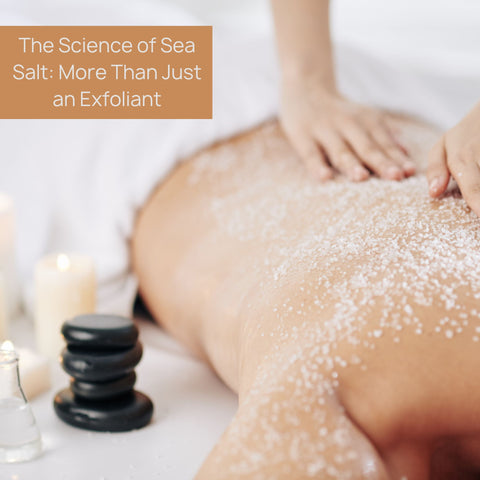
Sea salt's rich mineral composition provides numerous benefits in addition to its exfoliating properties. Let's look deeper into the science of sea salt and its various effects on the skin, including mineral content, hydration, antibacterial properties, anti-inflammatory effects, detoxification, antioxidant activity, wound healing, and pH balancing.
Unlocking the Mineral Magic: Essential Nutrients for Skin Health
Essential minerals are important for maintaining skin health and vitality. Here's a closer look at some key minerals and their effects on the skin:
-
Zinc is an essential mineral that aids in a variety of skin functions. It helps regulate oil production, which can help acne-prone skin by reducing excess sebum. Additionally, zinc possesses anti-inflammatory properties, making it effective in soothing irritation and promoting wound healing.
-
Magnesium is involved in a variety of biochemical processes in the body, including those about skin health. It helps to keep skin hydrated, supports the skin's natural barrier function, and has anti-inflammatory properties that can soothe sensitive or irritated skin.
-
Calcium is not only necessary for bone health, but it also promotes skin cell renewal and regeneration. It helps to maintain the skin barrier, which is essential for protecting against environmental damage and preventing moisture loss.
-
Potassium helps regulate the water balance in skin cells, resulting in optimal hydration levels. Adequate potassium intake can help prevent dryness and protect the skin's natural moisture barrier.
-
While excessive sodium intake can cause water retention and puffiness, sodium is still required to keep the skin hydrated and electrolyte-balanced. Topical applications of sodium chloride, such as sea salt, can aid in drawing moisture to the skin and improving hydration.
-
Selenium is an effective antioxidant that protects the skin from oxidative stress caused by free radicals. It boosts the skin's natural defences and may lower the risk of premature ageing and skin damage.
-
Iron is involved in the formation of haemoglobin, which transports oxygen to skin cells. Adequate iron levels are critical for maintaining healthy, glowing skin and avoiding dullness and fatigue.
-
Copper plays a role in collagen synthesis, which is essential for maintaining skin elasticity and firmness. It also has antioxidant properties that help protect the skin from damage caused by free radicals.
-
Sulfur is known for its antibacterial and antifungal properties, making it effective in treating acne and other skin conditions. It helps regulate oil production, unclog pores, and promote a clearer complexion.
How Sea Salt Reinforces the Skin Barrier
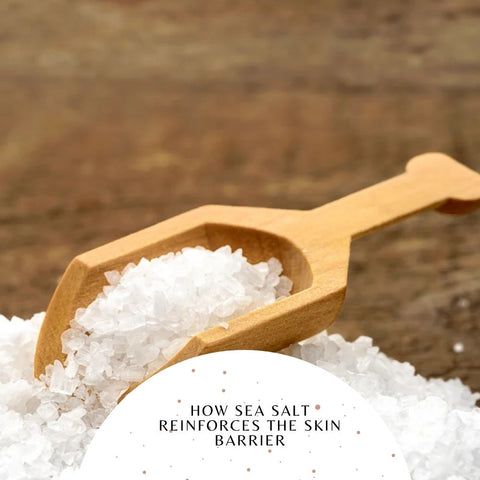
Sea salt strengthens the skin barrier via several mechanisms, making it an effective ingredient for maintaining skin health:
-
Sea salt has a pH that is similar to the skin's natural pH, which is typically between 4.5 and 5.5. Applying sea salt-containing products can help balance the pH of the skin, which is necessary for the skin barrier to remain intact. A balanced pH level helps support the skin's acid mantle, a protective barrier that defends against harmful bacteria, environmental pollutants, and other irritants.
-
Sea salt has hygroscopic properties, which means it attracts and retains moisture from the environment. When applied topically, sea salt can draw moisture to the skin, increasing hydration. Proper hydration is essential for maintaining the function of the skin barrier, as it prevents dryness, flakiness, and cracking.
-
While gentle exfoliation is useful for removing dead skin cells and increasing cell turnover, excessive exfoliation can damage the skin barrier. Sea salt is a gentle yet effective natural exfoliant that helps to slough off dead skin cells without irritating or damaging the skin barrier. By promoting healthy cell turnover, sea salt supports the renewal of the skin barrier.
-
Sea salt has natural antibacterial and antifungal properties that can help protect the skin from harmful microbes that may compromise the skin barrier. By inhibiting the growth of bacteria and fungi, sea salt helps to maintain a healthy microbial balance on the skin's surface, lowering the risk of infections and inflammatory skin diseases.
-
Inflammation can weaken the skin barrier, causing redness, irritation, and sensitivity. Sea salt contains minerals such as magnesium and potassium, both of which have anti-inflammatory properties. These minerals help to reduce inflammation, calm the skin, and aid in the repair and strengthening of the skin barrier.
-
Sea salt can help detoxify the skin by drawing out impurities, toxins, and excess oils through the pores. By removing these substances, sea salt aids the skin's natural detoxification processes, resulting in a clearer complexion and less strain on the skin barrier.
The Role of Sea Salt in Fighting Inflammation and Acne
Sea salt can play a beneficial role in fighting inflammation and acne due to its unique properties and mineral composition:
-
Antibacterial Action: Sea salt has natural antibacterial properties that can help fight acne-causing bacteria like Propionibacterium acne. By inhibiting the growth of these bacteria, sea salt can reduce the risk of acne breakouts and promote clearer skin.
-
Exfoliation: When applied topically, sea salt acts as a gentle exfoliator. Sea salt helps prevent acne by sloughing off dead skin cells and unclogging pores, preventing the buildup of debris and sebum. Regular sea salt exfoliation can help to achieve smoother, clearer skin and reduce the frequency of breakouts.
-
Anti-inflammatory Effects: Sea salt contains minerals such as magnesium and potassium that have anti-inflammatory properties. These minerals help to reduce inflammation, redness, and irritated skin caused by acne. By reducing inflammation, sea salt can help reduce the severity of acne lesions and promote faster healing.
-
Regulation of Oil Production: Sea salt can help regulate sebum production, which contributes to acne development. By balancing oil levels on the skin's surface, sea salt can prevent excess oiliness that can lead to clogged pores and breakouts. This control over sebum production can help maintain clearer, healthier-looking skin.
-
Osmotic Effect: Sea salt has an osmotic effect, which means it draws impurities, toxins, and moisture from the skin. This detoxifying action can help to cleanse the pores, remove buildup, and reduce the inflammation associated with acne. By purifying the skin, sea salt supports the natural healing process and promotes clearer skin.
-
Mineral Nourishment: Sea salt contains essential minerals such as magnesium, calcium, and potassium, which are beneficial to skin health. These minerals nourish the skin, support its normal functions, and promote overall skin balance. By providing essential nutrients, sea salt contributes to a healthier complexion and helps fortify the skin's defenses against acne.
Crafting Your Own Sea Salt Scrub: Ingredients and Methods
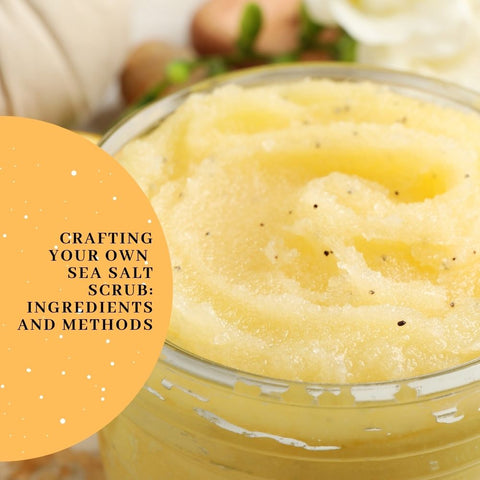
Making your own sea salt scrub is an enjoyable and rewarding way to personalise a skincare product based on your preferences and skin needs. Here's a simple recipe with different ingredient options and methods:
Basic Sea Salt Scrub Recipe: Ingredients are 1 cup of sea salt (preferably finely ground for a gentler scrub), 1/4 to 1/2 cup of carrier oil (such as almond oil, coconut oil, olive oil, or jojoba oil). Optional: Essential oils for fragrance and additional skincare benefits (lavender, tea tree, peppermint, etc.). Start with one cup of sea salt. You can experiment with different types of sea salt, such as Himalayan pink salt or Dead Sea salt, depending on your preference. Add 1/4 to 1/2 cup of carrier oil to the sea salt. Adjust the amount based on your desired consistency; you can add more oil for a smoother, more moisturizing scrub or less oil for a drier, more exfoliating texture. If desired, add a few drops of your favorite essential oils for fragrance and additional skincare benefits. Essential oils like lavender, tea tree, or peppermint can provide aromatherapy benefits and enhance the scrub's properties. Stir the ingredients together until well combined. Adjust the consistency by adding more oil or salt as needed until you achieve your desired texture. Transfer the sea salt scrub to a clean, airtight container for storage. Mason jars or reusable plastic containers work well for storing homemade scrubs.
Selecting the Right Sea Salt: From Fine to Coarse
The texture, mineral content, and intended use of the sea salt are important considerations when choosing the right one for your DIY scrub. The following guide will assist you in deciding between fine and coarse sea salt:
Fine Sea Salt:
-
Fine sea salt has smaller particles that are similar in size to table salt. It feels smooth and finely ground, making it ideal for gentle exfoliation.
-
Fine sea salt is ideal for people with sensitive or delicate skin because it provides gentle exfoliation without being overly abrasive. It helps to remove dead skin cells and impurities, leaving the skin smooth and soft.
-
While fine sea salt still contains essential minerals, the refining process may cause a loss of mineral content when compared to coarser varieties. However, it still provides skin benefits such as hydration and detoxification.
-
Fine sea salt mixes well with other ingredients, making it suitable for use in a variety of skincare recipes, including facial scrubs, body polishes, and bath salts. Its fine texture allows it to dissolve quickly, resulting in a smoother consistency in formulations.
Coarse Sea Salt:
-
Coarse sea salt contains larger granules with a rougher texture than fine sea salt. It feels more abrasive and offers more intense exfoliation.
-
Coarse sea salt is ideal for those who prefer a more vigorous exfoliation or have thicker skin in areas such as the elbows, knees, or feet. Its larger particles effectively remove dead skin cells and rough patches, leaving the skin feeling refreshed and energised.
-
Coarse sea salt retains more of its natural mineral content than finer varieties because it is processed less thoroughly. This makes it an excellent choice for those looking for all of the benefits of sea salt, such as hydration, mineral replenishment, and detoxification.
-
Coarse sea salt can also be used to decorate homemade bath salts or to top salt scrubs. Its larger crystals add visual interest and texture to the product, which improves the overall sensory experience.
Blending with Essential Oils: Customizing Your Scrub
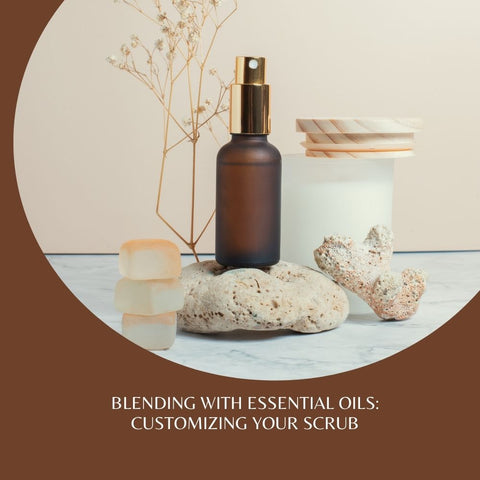
Blending essential oils and sea salt allows you to customise your scrub with different fragrances and skincare benefits. Here's a guide to selecting and blending essential oils for your homemade scrub:
Choosing Essential Oils:
-
Lavender essential oil is known for its calming and soothing effects. It is suitable for all skin types and has been shown to promote relaxation and reduce stress.
-
Tea tree essential oil has strong antibacterial and antifungal properties, making it ideal for acne-prone or oily skin. It helps to fight acne-causing bacteria and reduce inflammation.
-
Peppermint essential oil has a refreshing and invigorating fragrance. It has cooling properties that can help soothe irritated skin and reduce itching and inflammation.
-
Lemon essential oil is bright and uplifting, with a refreshing citrus aroma. It contains astringent properties that can help tone and clarify the skin, making it ideal for oily or acne-prone skin.
-
Chamomile essential oil is gentle and soothing, making it ideal for sensitive or irritated skin. It has anti-inflammatory properties that can help to reduce redness and irritation.
-
Eucalyptus essential oil has a fresh, menthol-like aroma. It is invigorating and can help clear sinus congestion, so it is ideal for use in shower scrubs.
-
Rosemary essential oil emits a woody, herbaceous scent. It stimulates and improves circulation, making it ideal for use in energising scrubs.
Blending Essential Oils:
-
Select essential oils that are appropriate for your skin type and address any specific issues you may be experiencing, such as acne, dryness, or sensitivity.
-
Experiment with various scent combinations to find a fragrance that suits you. You can combine several essential oils to create distinct scent profiles.
-
Essential oils are extremely concentrated and should be diluted before being applied to the skin. A general guideline is to use 10-20 drops of essential oil per cup of sea salt scrub, depending on your preferred fragrance intensity.
-
Before using a new essential oil or blend, perform a patch test on a small area of skin to ensure you don't have any adverse reactions.
DIY Recipes for Every Skin Type: Tailored to Your Needs
Creating DIY skincare recipes tailored to specific skin types can be both enjoyable and beneficial. Below are some simple recipes for each skin type:
- Normal Skin:
-
Cleansing Milk: Ingredients are 1/4 cup whole milk, 1 tablespoon honey. Mix milk and honey. Apply to face using a cotton pad, then rinse with lukewarm water. The milk gently cleanses, while honey moisturizes and soothes.
-
Balancing Face Mask: Ingredients are 2 tablespoons yogurt, 1 tablespoon oatmeal (finely ground), and 1 teaspoon honey. Mix all the ingredients into a paste. Apply to clean skin and leave on for 15-20 minutes. Rinse with warm water. Yogurt helps balance the skin's pH, oatmeal gently exfoliates, and honey hydrates.
2. Dry Skin:
-
Hydrating Avocado Mask: Ingredients are 1/2 ripe avocado, 1 tablespoon honey, 1 tablespoon olive oil. Mash avocado until smooth, then mix in honey and olive oil. Apply to clean skin and leave on for 15-20 minutes. Rinse with lukewarm water. Avocado nourishes and moisturizes, honey hydrates, and olive oil provides additional moisture.
-
Gentle Exfoliating Scrub: Ingredients are 1/4 cup coconut oil, 1/2 cup brown sugar. Mix coconut oil and brown sugar until well combined. Gently massage onto damp skin in circular motions, then rinse with warm water. Coconut oil moisturizes, while brown sugar exfoliates and removes dead skin cells.
3. Oily/Combination Skin:
-
Clarifying Clay Mask: Ingredients are 1 tablespoon bentonite clay, 1 tablespoon apple cider vinegar, 1 teaspoon honey. Mix bentonite clay and apple cider vinegar until smooth, then stir in honey. Apply to clean skin and leave on for 10-15 minutes. Rinse with warm water. Bentonite clay helps draw out impurities, apple cider vinegar balances pH, and honey soothes.
-
Tea Tree Toner: Ingredients are 1/4 cup witch hazel, 1 tablespoon aloe vera gel, 5-7 drops of tea tree essential oil. Mix witch hazel, aloe vera gel, and tea tree oil in a small bottle. Apply it to clean skin using a cotton pad. Witch hazel acts as an astringent, aloe vera soothes, and tea tree oil fights acne-causing bacteria.
4. Sensitive Skin:
-
Soothing Cucumber Mask: Ingredients are 1/2 cucumber (peeled and pureed), 1 tablespoon yogurt. Mix cucumber puree and yogurt until smooth. Apply to clean skin and leave on for 10-15 minutes. Rinse with cool water. Cucumber calms inflammation and hydrates, while yogurt soothes and balances pH.
-
Gentle Cleansing Oil: Ingredients are 1 tablespoon jojoba oil, 1 tablespoon sweet almond oil, and 1 tablespoon castor oil. Mix oils in a small bottle. Massage a small amount onto dry skin, then rinse with warm water. Jojoba oil mimics the skin's natural oils, sweet almond oil moisturizes, and castor oil cleanses without stripping.
Integrating Sea Salt Scrubs into Your Skincare Routine
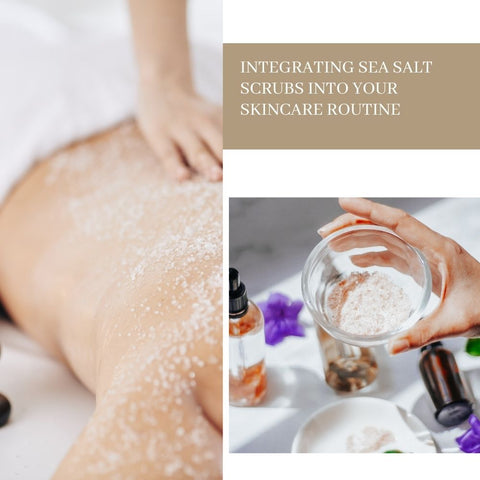
Incorporating sea salt scrubs into your skincare routine can provide numerous benefits for exfoliation, hydration, and overall skin health. Here's how to successfully incorporate sea salt scrubs:
-
Moderation is essential: While sea salt scrubs provide excellent exfoliation, they should not be used excessively. To avoid irritating or over-exfoliating your skin, limit your use of a sea salt scrub to 2-3 times a week.
-
Preferably in the Shower or Bath: Apply your sea salt scrub while your skin is damp. The steam and water soften the skin and open the pores, allowing for more exfoliation and absorption of the scrub ingredients.
-
Gentle Massage: Apply a small amount of sea salt scrub to damp skin. Gently massage the scrub into your skin in circular motions, focusing on rough or dry areas. Be careful not to scrub too hard, especially if you have sensitive skin.
-
Warm Water Rinse: After exfoliating with the sea salt scrub, thoroughly rinse with warm water. Take your time to remove all of the salt granules from your skin.
-
Lock in Hydration: After using the sea salt scrub, pat your skin dry with a towel and immediately apply a moisturiser or body oil to lock in moisture. This helps to replenish the moisture lost during exfoliation, keeping your skin soft and supple.
-
Be Sun Smart: Exfoliating with a sea salt scrub can make your skin more vulnerable to sun damage. If you are going outside after exfoliating, always use a broad-spectrum sunscreen with an SPF of 30 or higher, especially during peak sun hours.
-
Adjust for Sensitivity: If you have sensitive or delicate skin, use a finer-grained sea salt scrub and apply it less frequently. If you have thicker or oilier skin, you may prefer a coarser scrub for a more thorough exfoliation.
-
Explore Varieties: You can buy ready-made sea salt scrubs or make your own using natural ingredients. Experiment with different formulations and scents to see which works best for your skin.
-
Pay Attention to Signs: Monitor how your skin reacts to the sea salt scrub. If you experience redness, irritation, or discomfort, reduce your use or switch to a gentler formulation.
The Best Times for Exfoliation: Maximizing Benefits
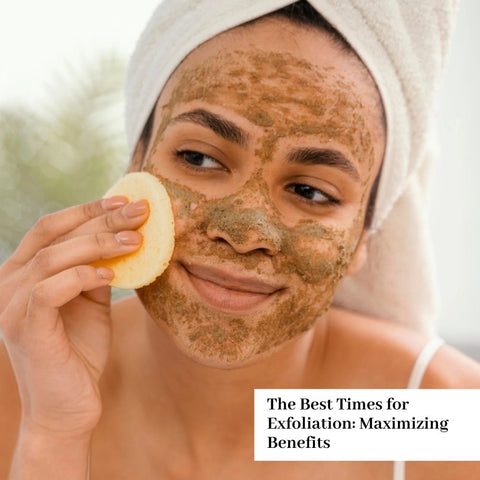
Exfoliation is an essential step in any skincare regimen, but timing it correctly can maximise its benefits while minimising potential side effects. Exfoliation is most effective when done in the evening, 2-3 times per week, before special events, before hair removal, before self-tanning, before skincare treatments, while showering or bathing, after cleansing, and when the skin feels dull. Exfoliating at the right times and frequency can help you get the most out of this essential skincare step while also keeping your skin healthy and vibrant. Adjust your exfoliation routine to meet the needs and sensitivity of your skin, and always finish with moisturiser and sunscreen to protect and nourish it.
Post-Scrub Care: Hydration and Protection
Following a scrub exfoliation, it is critical to moisturise and protect your skin with proper post-scrub care. Here are some essential steps to incorporate into your post-scrub routine:
-
Moisturize: After rinsing off the scrub, moisturise your skin while it is still damp. Moisturisers replenish lost moisture and act as a barrier to lock in hydration, keeping your skin soft and supple. Choose a moisturiser that suits your skin type and needs. If your skin is dry, use a rich, emollient moisturiser. For oily or acne-prone skin, choose a lightweight, non-comedogenic formulation.
-
Apply a Serum or Treatment: After moisturising, use a serum or treatment product to address specific skincare concerns like ageing, hyperpigmentation, or acne. Serums contain potent ingredients that penetrate deeply into the skin, providing benefits beyond simple hydration. Select a serum or treatment that targets your skin's specific needs and concerns. Look for ingredients like hyaluronic acid for hydration, vitamin C for brightness, and retinol for anti-aging properties.
-
Use Sunscreen: Sunscreen is essential, especially after exfoliation, because exfoliation can make your skin more vulnerable to UV damage. To protect your skin from harmful UVA and UVB rays, use a broad-spectrum sunscreen with an SPF of 30 or higher. If you will be spending time outside, reapply sunscreen every two hours, or more often if you are swimming or sweating. This contributes to continuous protection against sun damage.
-
Avoid Harsh Products: After exfoliating, do not use harsh or abrasive skincare products that may irritate or sensitise your skin. Choose gentle, soothing products to help restore the skin's natural balance and barrier function.
-
Hydrate from Within: To hydrate your skin from within, drink plenty of water throughout the day. Staying hydrated helps keep skin moisture levels stable and promotes overall skin health.
-
Protect Against Environmental Stressors: Use antioxidant-rich skincare products to protect your skin from environmental stressors such as pollution and free radicals. Antioxidants help to neutralise free radicals and prevent oxidative damage to the skin.
-
Establish a Consistent Routine: Consistency is essential for achieving and maintaining healthy, glowing skin. To keep your skin in good condition, follow a daily skincare routine that includes cleansing, exfoliating (if necessary), moisturising, and sun protection.
Frequency and Tips: Achieving Balanced Exfoliation
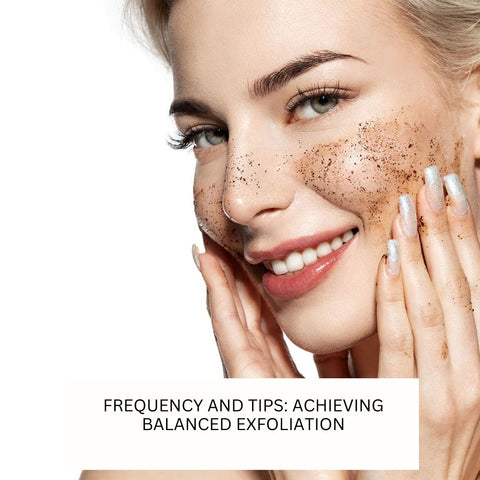
Balanced exfoliation is essential for maintaining healthy, radiant skin while avoiding irritation or damage. Understanding your skin type, listening to your skin, choosing the right exfoliant, alternate exfoliation methods, precautions, and patch testing new products are all helpful in determining the right frequency and achieving balanced exfoliation. By following these guidelines and tailoring your exfoliation routine to your skin's specific needs, you can achieve balanced exfoliation and maintain healthy, glowing skin without causing irritation or damage.
Holistic Benefits: Sea Salt Scrubs as a Wellness Ritual
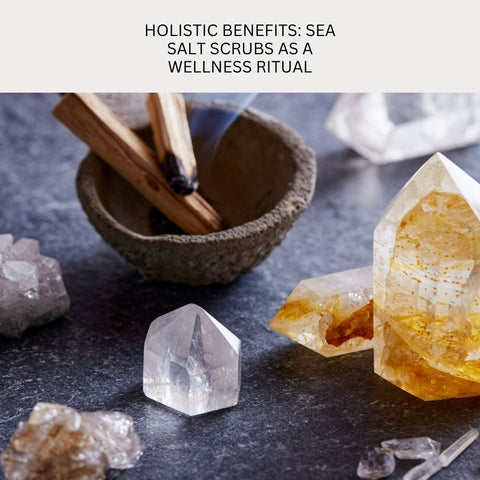
Sea salt scrubs can be used for more than just skincare; they can also be included in a holistic wellness routine that benefits both the body and the mind. Below are some examples of how sea salt scrubs can provide holistic benefits as a wellness practice:
-
Physical Exfoliation: Sea salt scrubs provide gentle physical exfoliation, removing dead skin cells, unclogging pores, and promoting smoother, softer skin. This physical exfoliation not only improves the appearance of your skin, but it also stimulates circulation, leaving you feeling refreshed and energised. Sea salt scrubs aid in detoxification by drawing impurities, toxins, and excess oils from the pores. This detoxification process not only improves skin health, but also creates a sense of purification and renewal.
-
Aromatherapy: Many sea salt scrubs contain essential oils with aromatherapeutic properties. The inhalation of these aromatic compounds can have a profound effect on mood and emotions, promoting relaxation, stress relief, and mental clarity. By choosing sea salt scrubs with specific essential oil blends, you can tailor your aromatherapy experience to suit your needs. For example, lavender essential oil is known for its calming properties, while peppermint essential oil is invigorating and refreshing.
-
Self-Care Ritual: Incorporating a sea salt scrub into your self-care routine can be a mindful practice that allows you to connect with your body and nurture yourself. Taking the time to care for your skin can promote feelings of self-love, acceptance, and gratitude. The sensory experience of using a sea salt scrub—feeling the texture of the salt, inhaling the aroma of the essential oils, and experiencing the sensation of exfoliation—can be deeply relaxing and pleasurable, helping to alleviate stress and tension.
-
Stress Relief: The act of indulging in a sea salt scrub can be a form of relaxation and stress relief. By focusing on the sensations of the scrub and being present in the moment, you can create a temporary escape from the stresses of daily life. Massaging the scrub onto your skin can help release tension and promote relaxation in the body. The rhythmic motion of massage combined with the soothing properties of the scrub can have a calming effect on both the body and mind.
-
Mind-Body Connection: Sea salt scrubs embody a holistic approach to wellness that recognizes the interconnectedness of the body, mind, and spirit. By nurturing your skin and senses, you can enhance your overall well-being and cultivate a deeper sense of harmony within yourself. Sea salt scrubs can complement other wellness practices such as meditation, yoga, or aromatherapy, enhancing their benefits and creating a synergistic effect on your overall health and vitality.
Beyond the Surface: The Broader Impact of Using Sea Salt Scrubs
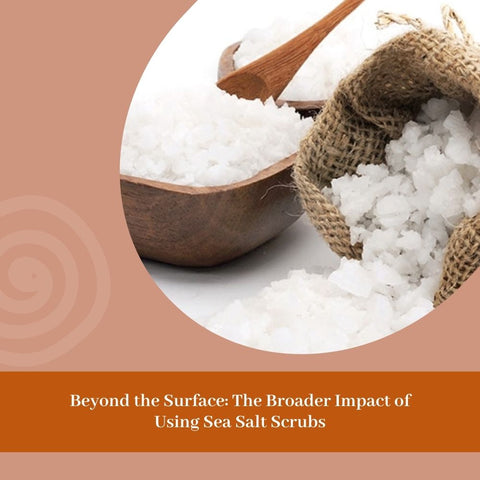
The advantages of using sea salt scrubs go beyond the skin's surface, affecting many aspects of personal well-being and even environmental sustainability. Here's how: environmental sustainability, mental and emotional wellness, social connection, and personal empowerment. Using sea salt scrubs has benefits beyond skincare, including improved personal well-being, environmental sustainability, and social connection. Sea salt scrubs can help people nourish their skin, relax, and connect with themselves and others.
































